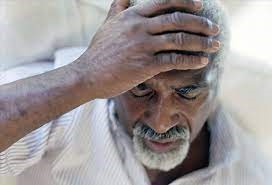Our people say when you stay too long on shit, you attract different kinds of flies. This saying may appear to apply to the elders particularly the very aged ones who need the love, warmth and affection of the society most, but are rather rewarded with discriminations and sometimes stigmatized for being too old. Rather than help the old people to navigate challenges out there in the hassles and bustles of life, the young generations and their cronies harass and insult the elders ‘admonishing’ them to go home and die.
Stigmatization and abuse can even come from the members of the family of the aged person. Several very old parents have space restrictions in their children and or in-laws’ houses and many of them neglected; lending credence to that old Yoruba adage that says when a woman stays too old in her husband home, she becomes a witch. This particular adage is nothing but an assault and geronticide on the geriatric population. Though the narrative has somewhat change from that of the 60s, when several old women were lynched to death because of a frivolous declaration that branded them witches in their communities, cases of elder abuse; traumatizing the elders to ‘early’ grave still abound in virtually all societies in the universe.
What’s Elders Abuse?
World Health Organization (WHO) defines elder abuse as a single or repeated act, or lack of appropriate action, occurring within any relationship where there is an expectation of trust, which causes harm or distress to an older person. This type of violence constitutes a violation of human rights and includes physical, sexual, psychological and emotional abuse; financial and material abuse; abandonment; neglect; and serious loss of dignity and respect.

Key facts– WHO
- Around 1 in 6 people 60 years and older experienced some form of abuse in community settings during the past year.
- Rates of elder abuse are high in institutions such as nursing homes and long-term care facilities, with 2 in 3 staff reporting that they have committed abuse in the past year.
- Rates of elder abuse have increased during the COVID-19 pandemic.
- Elder abuse can lead to serious physical injuries and long-term psychological consequences.
- Elder abuse is predicted to increase as many countries are experiencing rapidly ageing populations.
- The global population of people aged 60 years and older will more than double, from 900 million in 2015 to about 2 billion in 2050.
Elder abuse can have serious physical and mental health, financial, and social consequences, including, for instance, physical injuries, premature mortality, depression, cognitive decline, financial devastation and placement in nursing homes. For older people, the consequences of abuse can be especially serious and recovery may take longer. And often send the abused elder to ‘early’ grave.
According to a study by Mark S. Lachs et.al, “The Mortality of Elders Mistreatment”, negative social support such as mistreatment and other abuses increase elders’ mortality rate. The study asserted that mistreated seniors are more likely to be dead at the end of a 13 year- follow-up-period. The findings of the study were also corroborated by another study conducted by XinQi Dong et.al “Elder Self Neglect & Abuse and Mortality Risk in a Community Dwelling Population”. This study established a positive correlation between elders’ self-neglect/ abuse and increased risk of mortality.
Risk factors
The following conditions can make an Individual vulnerable or becoming a victim of abuse:
– functional dependence/disability
– poor physical health
-cognitive impairment
– poor mental health
– low income.
There are other risk factors particularly relating to perpetrators of elders’ abuse. These include mental illness, substance abuse and dependency .
Abuse can happen to any older adult, but often affects those who depend on others for help with activities of everyday life — including bathing, dressing, and taking medicine. Frail people are easy victims.
Types of Abuse
- Physical abuse: This happens when someone causes bodily harm by hitting, pushing, or slapping, space restrictions such as locking them in a room.
- Emotional abuse, sometimes called psychological abuse, can include a caregiver saying hurtful words, yelling, threatening, ignoring and keeping the older adult from seeing close friends and relatives.
- Neglect occurs when the caregiver does not try to respond to the older adult’s needs. This may include physical, emotional, and social needs, or withholding food, medications, or access to health care.
- Abandonment is leaving an older adult who needs help alone without planning for his or her care.
- Sexual abuse involves a caregiver forcing an older adult to watch or be part of sexual acts.
- Financial abuse happens when money or belongings are stolen from an older adult. It can include forging checks, taking elders’ retirement or Social Security benefits, or using the credit cards and bank accounts without their permission. It also includes changing names on a will, bank account, life insurance policy, or title to a house without permission.

Stopping elder abuse is the responsibility of everybody. Often, the abused elders are reluctant to report the perpetrators of abuse particularly when it comes from the family members. There are cases of elders setting up businesses for children with their retirement benefits, with the hope that the children will judiciously manage the businesses to pay them ROI for the rest of their lives, only to be neglected and abandoned by these same children. Many such elders are traumatized to death.
Many affluent elders that transferred the management of their estates and funds to their children had their fingers burnt because of the reckless spending of the juniors. Thus, putting permanent sores on the heart of the seniors
Also, there are cases of young adults who were too busy to look after their ageing parents’ medications and other needs but are readily available to spend lavishly on the post- death ceremonies of the parents.
Signs of Abuse
When senior adults aged over 60 changed, from being a jolly, witty and bubbling adult, to a withdrawn adult with dirt stains in the cloth, sores on the body and foul smells around him or her, such adults are surely suffering from abuse.
Geriatrics experts say that you may see the following signs of abuse or neglect when you visit an older adult:
- Stops taking part in activities he or she enjoys
- Looks messy, with unwashed hair or dirty clothes
- Has trouble sleeping
- Loses weight for no reason
- Becomes withdrawn or acts agitated or violent
- Displays signs of trauma, like rocking back and forth
- Has unexplained bruises, burns, cuts, or scars
- Has broken eyeglasses/frames, or physical signs of punishment or being restrained
- Develops bed sores or other preventable conditions
- Lacks medical aids (glasses, walker, dentures, hearing aid, medications)
- Has an eviction notice for unpaid rent, notice of late mortgage, or home eviction.
- Has hazardous, unsafe, or unclean living conditions
- Displays signs of insufficient care or unpaid bills despite adequate financial resources
Prevention
Successful prevention of abuse at old age starts from the young age. There is no doubting the fact that parents love their children hence they care for them with all their resources. But, hey! spare some thought for your old age when you are young. Ensure you reserve significant portion of your resources for your twilight so that you are less a burden on the younger generation. This must be the golden rule to prevent abuse at night.
Other prevention strategies according to experts include:
-caregiver interventions, to provide services to relieve the burden of caregiving
– money management programmes for older adults vulnerable to financial exploitation
– helplines and emergency shelters
-criminalizing elders’ abuse

WHO response
In line with WHO’s Global strategy and action plan on ageing and health and the UN Decade of Healthy Ageing (2021–2030), WHO and partners collaborate to prevent elder abuse through initiatives that help to identify, quantify, and respond to the problem, including:
- synthesizing evidence on the prevalence, consequences, determinants and interventions to prevent and respond to elder abuse, particularly in low- and middle-income countries where data are limited;
- disseminating information to countries and supporting national efforts to prevent elder abuse; and
- collaborating with international agencies and organizations to deter the problem globally.
Stop Elders Abuse
In case you don’t know how elders abuse is perpetrated, read below:
-if you delayed or failed to provide essentials for the upkeep of your ageing parents
-If you denied your ageing parents regular visitations
-if you took advantage of elders’ sight challenge to help yourself with his or her belongings without authorization
-if you deprived him or her of socialization
-if you made him or her, feel abandoned
-If you made him or her promises you can’t keep
-if your lifestyle is making him or her unhappy
If you have done or doing any of the above, you are a perpetrator of elder abuse and culpable of gradually killing the elderly. PLEASE STOP.
Source: Dare Agbeluyi, Chief Publisher.
Publisher’s Note:
- Leave your comments in the comments box below and share the post
- Send your health- related articles, stories, tips to compack2006@yahoo.co.uk for free publication
- Like and share our Facebook page: @citizencomfortng


